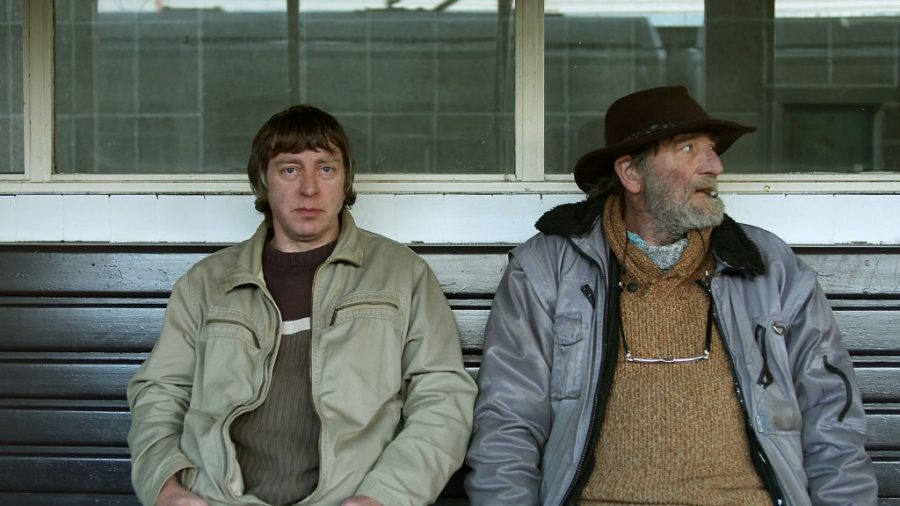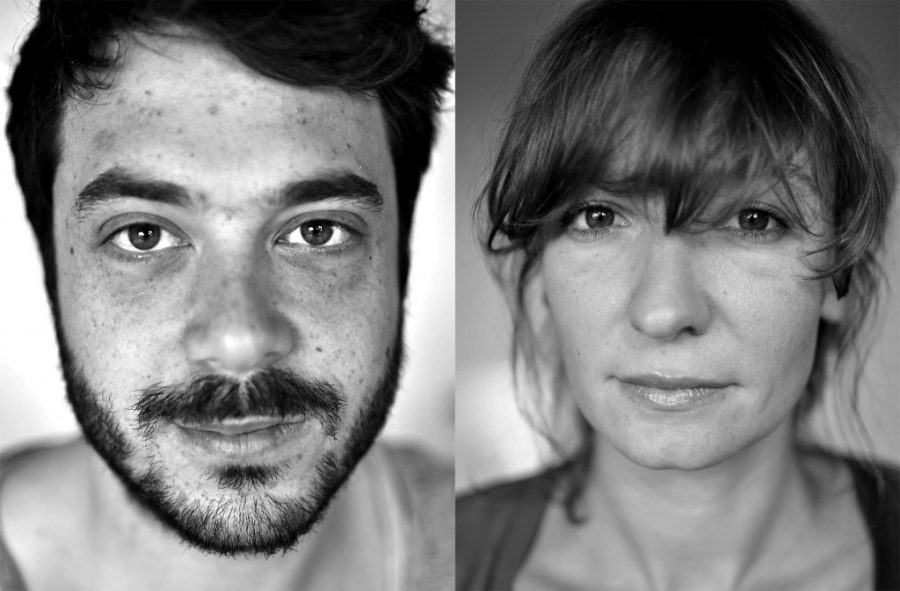
 When his wife leaves him, taking their three kids with her, Belgian farmer Marcel sinks into the kind of depression Alexander Payne makes movies about. Going on drinking binges and contemplating several ways of committing suicide, his only confidant is his friend Bob, a tall, stern “cowboy”-type, who gulps down rum as he imparts sage advice. Their relationship is the emotional center of the touching documentary “Ne me quitte pas” directed by the team of Sabine Lubbe Bakker and Niels van Koevorden, who explore male friendship through a lens that includes melancholy and droll humor.
When his wife leaves him, taking their three kids with her, Belgian farmer Marcel sinks into the kind of depression Alexander Payne makes movies about. Going on drinking binges and contemplating several ways of committing suicide, his only confidant is his friend Bob, a tall, stern “cowboy”-type, who gulps down rum as he imparts sage advice. Their relationship is the emotional center of the touching documentary “Ne me quitte pas” directed by the team of Sabine Lubbe Bakker and Niels van Koevorden, who explore male friendship through a lens that includes melancholy and droll humor.
The film makes its American debut as part of the Tribeca Film Festival’s World Documentary Competition, where it stands on ground of its own, as the rare documentary that could very well pass off as a fiction feature. The filmmakers’ pitch perfect aesthetic choices and their decision not to appear in the film, make it feel like it has more in common with “Sideways” than say “The Fog of War” for example. We sat down with Bakker and Koevorden who explained how they met the characters, discussed the shooting process and elaborate on how they picked a key song for their film.
StageBuddy: How did you discover these characters?
Niels: One of the characters, Bob, was the character in my first little documentary about ten years ago and when Sabine and I met and decided to make a film in Belgium, because we both grew up there, the first thing we did was we went to this village to visit Bob and by that time he had met Marcel. There was something between those guys that just attracted us, we had to go back and we kept going there for more than three years…
Sabine: ...but in the beginning we tried very different things and thought it might be difficult because they drink so much and we thought it would be funny, but were worried it would just become a film about two alcoholics. We fell in love with them, and how they interacted, we really tried to stay away but we couldn’t.
StageBuddy: So, Niels, can you go back ten years ago and elaborate on what attracted you to Bob initially?
Niels: I wanted to make a film about a little village, it wasn’t about Bob, but he was the only Flemish-speaking person in the village so I needed to meet him, and he was also kind of the unofficial mayor. In that film he only had a small role because he was working for the company that brings flowers to all the supermarkets in Belgium and every week he would take the flowers that weren’t good enough anymore and he would take them back to the village on Friday and give them to all the ladies.
Sabine: Also, when at the beginning of the film we have a scene of Bob trying to find his “tree of life” and he’s looking back at his life and then we realized his tree had been cut down, it was then when we realized “here’s our film”. It represented Belgium for us. The place where we grew up, the humor we like.
Niels: It was there where we realized our movie as about more than two alcoholics, it was also about failure and dreams. When we started writing our script we took “Waiting for Godot” as a guideline, because it’s also about two guys waiting under a tree for something to happen, only they don’t know what it is.

StageBuddy: Can you talk more about the location? Being in New York, you get a sense that places like these don’t exist anymore…
Sabine: ...which is funny because this is only 90 minutes away from Brussels, which is the capital of Europe. This place is hidden, in the summer it’s gorgeous, you can walk around and wander…
Niels: ...it’s also where we went as children during the weekends.
Sabine: In winter it’s a very sad place, the walls are very thick, very small windows so it’s a very specific part of Belgium, it feels very far away from everything. But most of the people who live there like this seclusion.
Niels: It’s also a border region. I think the closer you get to a border, the more things turn grey instead of black and white. The rules start to fade away.
StageBuddy: When you were shooting the film was it just the two of you with your cameras?
Sabine: Yes, we did everything ourselves.
StageBuddy: How did having two people from the city arrive to the village with cameras disrupt their existence? Were people hiding from you?
Sabine: No. Well there were some people who didn’t like it and they were going “oh those Dutch people again”, but there were others who really liked it. We made a lot of friends there. In fact we’ll premiere the film in the village in May, we’re throwing a big party. Bob and Marcel at the beginning of course had to get used to us being there with the microphones and the cameras and sitting in their kitchen for hours. We kept telling them “pretend we’re not there” as most documentary filmmakers do, but after a while they liked it, it gave them something to do.
Niels: We also lived there, we rented a house and we went there once a month for a week. There were days when they had specific things to do, like go to the dentist or to the rehab facility, but there were other days when we had to wait for something to happen.
Sabine: Most of the table conversations were about women, or their children and Niels and I by now just need to look at each other and know it’s something good. We just needed a look to know it was the perfect time to start shooting. It was a long process but we were a very well oiled machine.
![NMQP_still_two_shot_tafel[47560]](https://stagebuddy.com/wp-content/uploads/2014/04/NMQP_still_two_shot_tafel47560-1024x576.jpg) StageBuddy: Watching the film you get a sense that these men are putting on a performance. Besides asking them to ignore you and the cameras, did you teach them any acting techniques?
StageBuddy: Watching the film you get a sense that these men are putting on a performance. Besides asking them to ignore you and the cameras, did you teach them any acting techniques?
Niels: No, it’s all just the decision for us not to be in the film ourselves and just to cut out every reference to us and the camera and the audience, just that alone makes you feel like it’s fiction. Also our selection of rushes, since we only picked things that were “better than fiction”. If we would’ve written them dialogues, it wouldn’t have worked.
Sabine: Marcel has a very good sense of timing, his emotions are stuck to the outside of his body. Sometimes we think he should be an actor. We laughed so much and cried during the shoot and then we have Bob who is the opposite, he tries to keep in his emotions, he does not want to play them out at all. So they were two friends who helped each other in front of the camera. We were lucky that this was a small village and in small villages people talk about the same thing a lot, which is fantastic for filmmaking. They also drink a lot, so they forget a lot so it made it easier to do repeat shots. We should hire them if we make a narrative!
Niels: We probably would make more money being their agents (laughs).
StageBuddy: As documentary filmmakers how hard or easy was it for you not to interfere with your subjects? At times we have these two men doing things that might even put their lives in jeopardy…
Sabine: We get this question a lot and it’s my favorite question. This film is about the ruthless friendship between these two men and we think it’s very beautiful. They’re being hard on each other but they also don’t pity each other, they have a kind of respect. Of course every now and then we would help them if it was necessary, but Marcel just wanted to destroy himself after his wife left him, and you can never take care of someone 24/7 and Bob would just say “go”.
Niels: It’s all about not pitying them, they demanded it in a way. We really love those guys and as a human being you want to interfere, but as a filmmaker you know you need to stay away.
StageBuddy: I found it interesting that while you named the film after Jacques Brel’s iconic “Ne Me Quitte Pas”, you have the best musical scene in the film set to Roxette’s “Listen to Your Heart”...
Niels: In fact it’s a cover of the Roxette song (by Belgian band D.H.T), which we didn’t even know when we were making the film. We just found it one day...
Sabine: ...and we thought it would be a perfect piece of Belgian kitsch for our film.
“Ne me quitte pas” is playing as part of the World Documentary Competition at the Tribeca Film Festival.